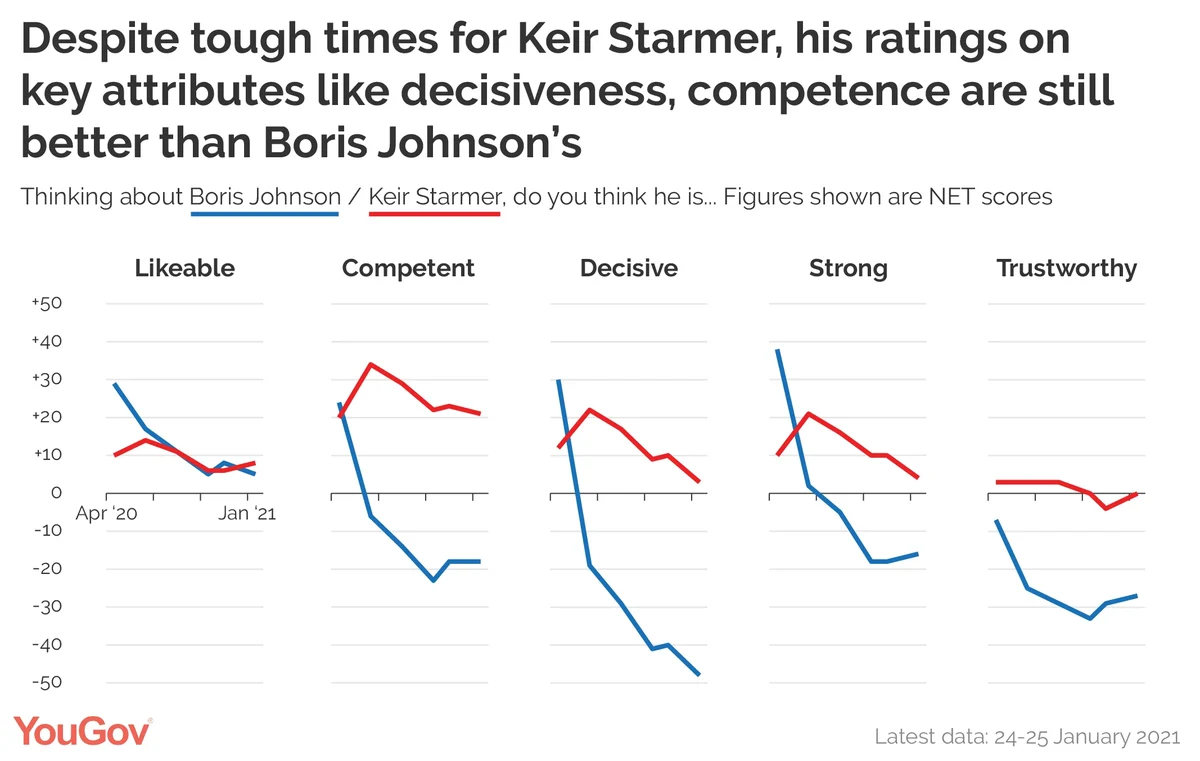The opposition leader's favourability rating has fallen to its lowest level yet
A lot has been discussed of late regarding Keir Starmer’s performance as Labour leader, and after possibly his toughest few weeks in charge our latest favourability figures show there has been a drop in his personal ratings.
Just over a third of the public (37%) now have a favourable view of Starmer, compared to 43% who have an unfavourable view. This gives him a net favourability score of -6, down nine points from +3 at the end of January. His ratings have fluctuated over his 10 months in charge but are now a fair way from his previous highs of +14 in June and +12 in September.
What could be Starmer’s main cause for concern is that a quarter (24%) of those who voted Labour in 2019 have an unfavourable view of their party leader, although 60% still hold a favourable opinion. In fact, his personal approval rating is now better amongst 2019 Lib Dem voters, who have a favourable opinion of him by 68% to 19%. He also has the support of one in five (21%) 2019 Conservative voters.
Nevertheless, on net approval Starmer is still performing better than his opposite number, Boris Johnson, who has a net favourability score of -15. While 38% have a favourable opinion of the prime minister (virtually the same as Starmer), more have an unfavourable view of him (53%) than the Labour leader.
Starmer is also doing considerably better than his predecessor Jeremy Corbyn, whose final net score before handing over the reins was -45 (20% favourable, 65% unfavourable). In fact, Corbyn only received a net score better than Starmer’s current -6 on two occasions, both in the immediate aftermath of the 2017 general election.
Another thing to note is that Starmer is currently performing better amongst the public than the Labour party itself (-13). This isn’t the case, however, amongst 2019 Labour voters, where his net score of +36 is far from the +62 the party has. His overall score is therefore being propped up by those who voted for other parties in 2019, which is a good sign, given that the road to Number 10 will require winning over such voters.
Boris Johnson is similarly slightly less unpopular than his party (-15 vs -20). However, amongst 2019 Tory voters, they perform almost identically (Johnson +52, Conservatives +53). This is maybe to be expected given he was the leader in the last election whereas Starmer was not in charge when those who voted Labour in the last election cast their ballots.
Keir Starmer still outperforms Boris Johnson on key attributes
To dig a bit deeper into Starmer’s falling approval rating, we can use YouGov tracking data to test how the public view him across five key characteristics.
While the number expressing an opinion on Starmer has been increasing over time, it is worth noting that many people are still unsure of the Labour leader across all characteristics. There was an initial drop in don’t knows between April and June 2020 that coincided with a positive boost for Starmer across most of the characteristics. Since then, increased awareness of the leader has been slower and tended to be accompanied by an increase in negative sentiment.
Our latest data from late January shows that Starmer’s best characteristic in the public’s eyes is his competence, with 42% saying he is competent compared to 21% who consider him incompetent (a net score of +21). This view is almost unchanged since the previous survey in November 2020 when he had a net score of +23, though it has fallen from a peak of +34 in June last year.
Starmer’s ‘likeability’ rating has held steady, with 36% of the public currently seeing him as likable compared to 28% who see him as dislikeable, a net score of +8.
When it comes to trust in the Labour leader, the public are completely split: 29% say he is trustworthy, 29% untrustworthy (a net score of 0). While these latest numbers aren’t anything to write home about, they actually represent a small increase in trust since November, when Starmer had a net score of -4.
This leaves his decisiveness and strength as a leader, both of which have seen continued gradual drops since June last year, and perhaps go some way to explaining the drop in his favourability more generally. In our latest results, 33% think Starmer is decisive while 30% think he is indecisive, giving him a net score of +3. This is a fall from +10 in November, and is a long way off his peak decisiveness score in June 2020 of +22, when 37% saw him as decisive and just 15% undecisive.
There has also been a decline in the number of people thinking Starmer is a strong leader. Between November and January, the Labour leader’s rating on this measure declined from +10 to +4, with 30% currently considering him strong vs 26% weak. Again, Starmer’s leadership reputation is a far cry from how it was in June, when he enjoyed a net score of +21.

Despite the drop in these two characteristics, he continues to perform better than Johnson on both. The Prime Minister has a net score of -16 for ‘strong leader’ and -48 for decisiveness, the latter decreasing rapidly throughout the second half of 2020. In fact, when looking at net scores Starmer performs better than Johnson across all five characteristics, albeit very narrowly when it comes to likeability.
Shortly after taking the Labour leadership, Keir Starmer pledged to provide ‘constructive opposition’ to the Conservative government. While his perceived competence has diminished since June, it still seems to be a real asset. He may need to show more strength and decisiveness if he wants to prevent further drops in his overall approval as opposition leader, and win over those who are yet to make up their mind.
See the latest favourability results here and the historical favourability results here
Keir Starmer attribute tracker results: trustworthy / competent / likeable / strong leader / decisive
Boris Johnson attribute tracker results: trustworthy / competent / likeable / strong leader / decisive









